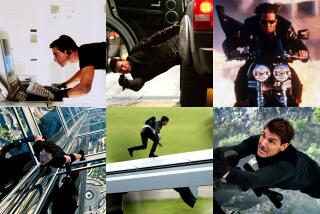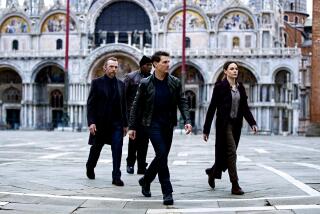‘Oblivion’: Sci-fi pastiche doesn’t come together, reviews say
- Share via
These days it seems rare to encounter a big sci-fi movie that’s not a remake, a sequel, a prequel or an adaptation of a well-known property (whether a novel, a comic book or even a toy). The new Tom Cruise film “Oblivion” is an exception: This story of a solitary drone repairman on a devastated future Earth grew out of director Joseph Kosinski’s (“Tron: Legacy”) own unpublished graphic novel.
According to a number of lukewarm reviews, however, the film’s originality is undercut by its derivativeness, as it borrows liberally from the sci-fi canon.
In one of the more positive reviews, The Times’ Kenneth Turan calls “Oblivion” a “throwback to the days when on-screen science fiction was about speculative ideas rather than selling toys to tots. But, he adds, “‘Oblivion’ is not perfect. Its dystopian story makes no apologies for its familiarity, echoing such films as ‘The Planet of the Apes,’ ‘The Matrix,’ ‘2001’ and even ‘Wall-E.’”
The film does benefit, Turan says, from Kosinski’s “sleekly futuristic” visuals and a solid performance from Cruise, “essential in bringing conviction and credibility to this made-up world.”
Claudia Puig of USA Today agrees that “‘Oblivion’ is a slick spectacle” and “Cruise’s performance as Jack Harper is the best of the lot.” On the other hand, “The plot’s muddled internal logic leaves some substantial holes,” and the film is “startlingly derivative as Kosinski … draws from a grab bag of sci-fi predecessors, including ‘Wall-E,’ ‘Total Recall,’ ‘Planet of the Apes’ and ‘The Matrix.’” Ultimately, Puig says, “neither the sci-fi or the vague political commentary are involving.”
The New York Times’ Manohla Dargis writes, “The problem with ‘Oblivion’ … is that it’s been stitched together from bits and pieces that evoke numerous other, far better far-out tales and ideas, conceits and characters from the likes of Philip K. Dick, the Wachowskis, J.G. Ballard and Duncan Jones. … No matter how hard Mr. Cruise squares his jaw or flings his body over and against the scenery, and despite the presence of Morgan Freeman, Olga Kurylenko and Nikolaj Coster-Waldau, who trickle into the story to aid in Jack’s journey, ‘Oblivion’ never transcends its inspirations to become anything other than a thin copy.”
PHOTOS: Hollywood backlot moments
The Chicago Tribune’s Michael Phillips says, “The movie’s not bad for a while, but it’s made of spare parts from a lot of other movies, among them ‘Total Recall,’ ‘2001: A Space Odyssey,’ the ‘2001’ riff ‘Moon,’ a certain recent play by Caryl Churchill (can’t say; spoiler) and a few others.”
Writing for CNN, Tom Charity calls the film “glossy, derivative, ambitious and fatally underpowered.” He continues: “if you poured all the most memorable sci-fi films from the past half century into a blender, from ‘2001: A Space Odyssey’ and the original ‘Planet of the Apes’ all the way down to last year’s ‘Prometheus,’ you would probably wind up with something very similar and equally synthetic — though quite possibly more exciting.”
Similarly, Chris Nashawaty of Entertainment Weekly writes, “I would describe the movie as a mash-up of ‘The Matrix,’ ‘Blade Runner,’ and ‘Planet of the Apes,’ but that makes it sound better than it is.” The film is “stylishly directed,” Nashawaty says, but in the end, “all the eye candy in the world can’t mask the sensation that you’ve seen this all before … and done better. Too bad the movie’s script wasn’t given the same attention as its sleek, brave-new-world look.”
In other words, according to critics, “Oblivion” is never greater than the sum of its parts.
ALSO:
M83 to score Tom Cruise sci-fi epic ‘Oblivion’
‘Oblivion’: Tom Cruise on Iceland filming, character building
‘Oblivion’: Tom Cruise talks return to big-screen spectacle sci-fi
More to Read
Only good movies
Get the Indie Focus newsletter, Mark Olsen's weekly guide to the world of cinema.
You may occasionally receive promotional content from the Los Angeles Times.










